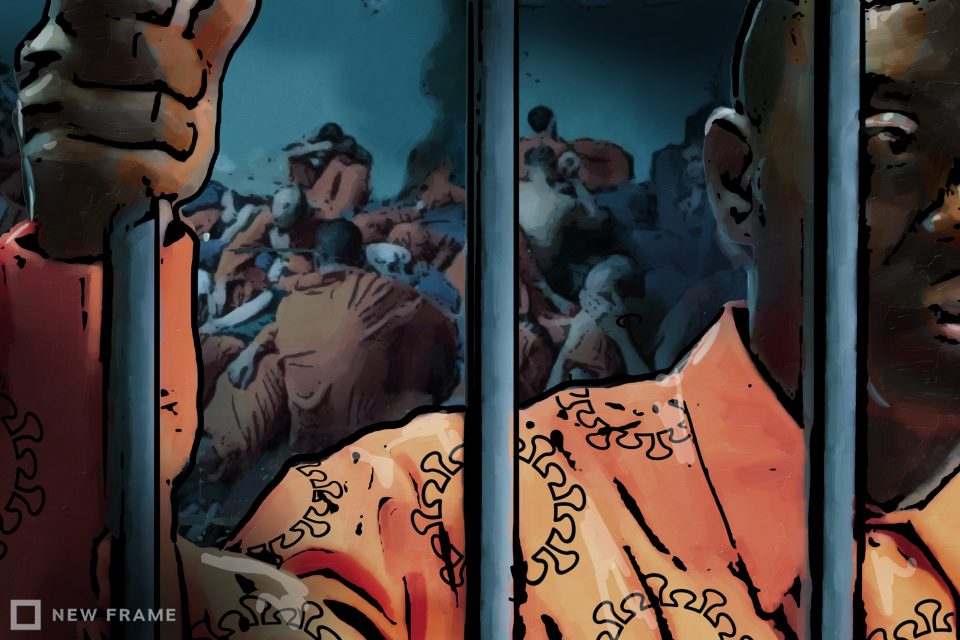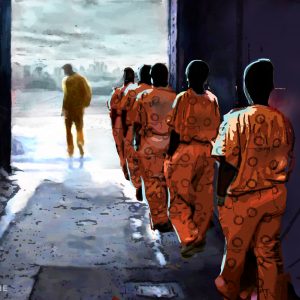Pietermaritzburg prisoners fear Covid-19
Inmates serving lengthy sentences for serious and violent crimes say basic regulations to combat the spread of the coronavirus are being flouted, putting their lives at risk.
Author:
1 July 2020

No social distancing because of overcrowding, poor-quality masks and a lack of sanitisers are just some of the reasons inmates at New Prison in Pietermaritzburg, KwaZulu-Natal, fear for their lives after four prisoners allegedly tested positive for Covid-19 more than two weeks ago.
The Department of Correctional Services has refuted the claims made by the inmates. “The allegations made are unfortunately distant from the actual reality,” said department spokesperson Singabakho Nxumalo. “As the number of infected people increase in correctional services, the containment and treatment pillar of the disaster management response strategy … has been activated.”
Nxumalo says there are healthcare teams on site with appropriate personal protective equipment (PPE) such as goggles, gloves, masks and gowns. These are used when rendering care services to patients in distress and while monitoring those likely to develop acute respiratory challenges.
But the prisoners disagree. A 42-year-old inmate serving time for a house robbery in 2016 claims that four inmates tested positive after cleaning the warders’ sleeping quarters. “So they work as cleaners at these quarters and they are fetched every morning and brought back in the afternoon,” he said. “One day a warder fell ill and tested positive for Covid-19. Then all four of those cleaners in E Section fell ill.”
Related article:
The man claims that a lack of testing and tracing in the facility could see more inmates being infected by the deadly virus. “Even the warders were complaining that they are not being tested by the government. There is no one from the government who is doing testing and tracing inside here.”
The four inmates who apparently tested positive were taken to the prison hospital. “We are not even sure if that place was cleaned before they were taken there. The nurses are scared to treat the inmates, and the inmates are also scared of the nurses because of the stigma and they do not have the right PPE as well. We were told that they were told to steam and exercise and the virus will go away.”
Fear and distrust
Even though the affected inmates have seemingly been isolated, the prisoners say they are not sure how far and wide the virus may have spread. “We may have done worse things like committing crime, but we are genuinely scared of dying of Covid-19. And what is scarier is that the public will not know because they love sweeping things under the carpet here.”
The department said on 22 June that the number of confirmed Covid-19 cases was 1 938, comprising 762 correctional services officials and 1 176 inmates. “Regrettably, the department has registered at least 16 fatalities thus far,” it said. In KwaZulu-Natal, 11 officials and two inmates had tested positive and there had been nine recoveries. No deaths had been recorded.
A 33-year-old serving 12 years for murder says he is worried about his 13-year-old son who recently had to go back to school. Schools reopened on 8 June after a two-month break. “I miss seeing my family and my son. I worry about him. I was heartbroken that he had to go back to school. It gives me sleepless nights just thinking about the possibility of never seeing him again if he gets the virus at school.”
Related article:
While he fears for his son’s life, his own life is also at risk, he says. “They come and spray our cells with Jik and water once in a while, and they only gave us one mask each. So when we have to wash it, we have to wait for it to dry.”
He says the chances of getting infected with Covid-19 while performing ablutions are high because inmates are forced to have cold showers and these are overcrowded. “Twelve prisoners take a shower at the same time and there is no hygiene there. The water is freezing cold and we know that the chances of getting the virus are higher during winter, so some inmates don’t shower,” he says.
While the man acknowledges that he is a criminal, he says he too has a right to life. “What I did was wrong and I am paying for it, but it does not take away my human right to life.”
Early release
With regard to the government’s decision to release about 19 000 prisoners on early parole to relieve the overcrowding in prisons, the man says the wrong inmates are benefitting from this measure to curb the spread of Covid-19.
“The prisoners that they are releasing are the ones that committed petty crimes and they have not been rehabilitated properly like us. What is happening is that they are going out there and committing crimes again, [whereas] we know that we will never commit a crime again because we have learnt our lesson.”
Related article:
The release and rearrest of former inmates places the lives of other prisoners at risk, says the inmate. “We spend all our lives inside and if someone is released and they get Covid-19, then we are all in trouble. There are already cases of Covid-19 and we are worried that we are also going to get it. And if that happens, we will never see our families again.”
He says it is also unfair that visitors are not allowed. “Hygiene is important and the prison does not provide toiletries such as toothbrushes and good soaps. We rely on our families to do that. If we were allowed visitors, we could even organise good-quality masks and hand sanitiser,” he said.
“Seeing visitors is also good for our mental health because life inside is psychologically damaging. Seeing a familiar face gives you hope that things will be fine. Even socialising with them is important.”
Too little, too late
A 35-year-old man serving a life sentence for rape says it has been more than 90 days since President Cyril Ramaphosa announced the state of disaster and yet inmates only received masks in mid-June last week. “The masks are made of the same material they use to make our sheets. There is no social distancing and we have never seen sanitisers or used them inside the prison,” said the father of three who was sentenced in 2015.
He complained about overcrowding in the cells, which makes it difficult to practise the mandatory physical distancing. “We are meant to be three inmates in one cell, but there are seven of us. Three sleep on the bed and four sleep on the flour – it depends on who arrived first.”
He says when they queue for breakfast, “prisoners line up on top of one another … The queue is so long it is like we are lining up for the government Sassa [South African Social Security Agency] grant, and you know how bad those are. We do not even get our temperatures taken or [our hands] sanitised in those queues. The only time we have seen sanitisers is when you are called into an official’s office, you see them on their desks.”
The Durban man says being incarcerated is difficult. “In the real world, when something is bothering you, you can complain. In here you end up being made a bad person if you speak up.” He says inmates who raise issues are victimised by being placed in isolation and “the warders know that they are always in control”.
Another inmate says “prisoners’ rights do not exist inside prison” and some prisoners are treated worse than others. “Most of the prisoners who have proper protective gear are the ones who work as cleaners. They have gloves and their masks are different from ours.
“Even if the warders cared about us, there is nothing they can do for us because it is the system that is rotten. There are prisoners who are sitting in isolation as we speak, but they are not even sick. Here we only wear masks in front of the warders, it is only to protect and respect them.”
The father of two, who is serving 14 years for culpable homicide, wants Minister of Justice and Correctional Services Ronald Lamola to visit New Prison to see the lack of compliance with Covid-19 regulations. “They need to come and see for themselves what is happening inside.”
Adjusting measures
Nxumalo says correctional centres where cases have been reported are being disinfected. “This is to prevent contamination of surfaces and inanimate objects. [The department] is now splitting out-of-cell time for the distribution of food. This will mean that units or wings are divided in order to avoid the concentration of inmates and officials in open spaces. This measure does not abolish access to open air, which is mandatory for inmates.”
Related article:
He says visitors will not be allowed for the foreseeable future, and that the department has advised correctional centres to increase the number of items inmates are allowed to buy from tuck shops. It has also increased the amount of toiletries provided to inmates.
More than 600 professional healthcare practitioners have been employed to take care of the sick, says Nxumalo. However, he acknowledges that inmates are vulnerable owing to the movement in and out of prisons of warders and other correctional services officials. “Officials attending gatherings and movements from their residences to places of work are receiving attention in addition to screening,” he says.




